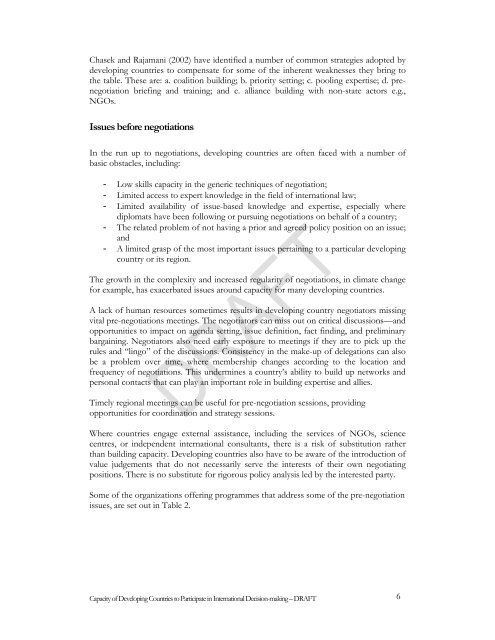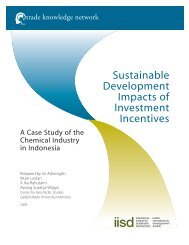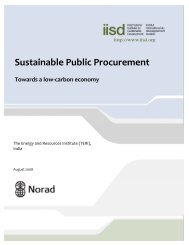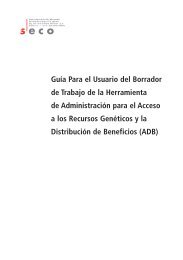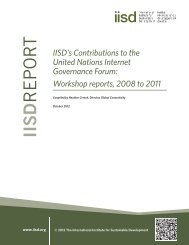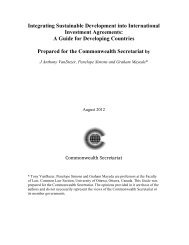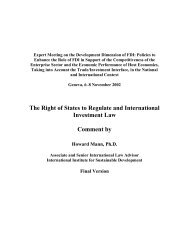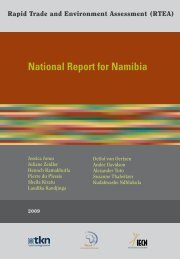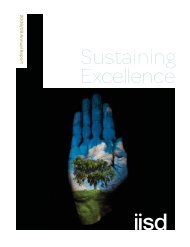Capacity of Developing Countries to Participate in International ...
Capacity of Developing Countries to Participate in International ...
Capacity of Developing Countries to Participate in International ...
Create successful ePaper yourself
Turn your PDF publications into a flip-book with our unique Google optimized e-Paper software.
Chasek and Rajamani (2002) have identified a number <strong>of</strong> common strategies adopted by<br />
develop<strong>in</strong>g countries <strong>to</strong> compensate for some <strong>of</strong> the <strong>in</strong>herent weaknesses they br<strong>in</strong>g <strong>to</strong><br />
the table. These are: a. coalition build<strong>in</strong>g; b. priority sett<strong>in</strong>g; c. pool<strong>in</strong>g expertise; d. prenegotiation<br />
brief<strong>in</strong>g and tra<strong>in</strong><strong>in</strong>g; and e. alliance build<strong>in</strong>g with non-state ac<strong>to</strong>rs e.g.,<br />
NGOs.<br />
Issues before negotiations<br />
In the run up <strong>to</strong> negotiations, develop<strong>in</strong>g countries are <strong>of</strong>ten faced with a number <strong>of</strong><br />
basic obstacles, <strong>in</strong>clud<strong>in</strong>g:<br />
- Low skills capacity <strong>in</strong> the generic techniques <strong>of</strong> negotiation;<br />
- Limited access <strong>to</strong> expert knowledge <strong>in</strong> the field <strong>of</strong> <strong>in</strong>ternational law;<br />
- Limited availability <strong>of</strong> issue-based knowledge and expertise, especially where<br />
diplomats have been follow<strong>in</strong>g or pursu<strong>in</strong>g negotiations on behalf <strong>of</strong> a country;<br />
- The related problem <strong>of</strong> not hav<strong>in</strong>g a prior and agreed policy position on an issue;<br />
and<br />
- A limited grasp <strong>of</strong> the most important issues perta<strong>in</strong><strong>in</strong>g <strong>to</strong> a particular develop<strong>in</strong>g<br />
country or its region.<br />
The growth <strong>in</strong> the complexity and <strong>in</strong>creased regularity <strong>of</strong> negotiations, <strong>in</strong> climate change<br />
for example, has exacerbated issues around capacity for many develop<strong>in</strong>g countries.<br />
A lack <strong>of</strong> human resources sometimes results <strong>in</strong> develop<strong>in</strong>g country negotia<strong>to</strong>rs miss<strong>in</strong>g<br />
vital pre-negotiations meet<strong>in</strong>gs. The negotia<strong>to</strong>rs can miss out on critical discussions—and<br />
opportunities <strong>to</strong> impact on agenda sett<strong>in</strong>g, issue def<strong>in</strong>ition, fact f<strong>in</strong>d<strong>in</strong>g, and prelim<strong>in</strong>ary<br />
barga<strong>in</strong><strong>in</strong>g. Negotia<strong>to</strong>rs also need early exposure <strong>to</strong> meet<strong>in</strong>gs if they are <strong>to</strong> pick up the<br />
rules and “l<strong>in</strong>go” <strong>of</strong> the discussions. Consistency <strong>in</strong> the make-up <strong>of</strong> delegations can also<br />
be a problem over time, where membership changes accord<strong>in</strong>g <strong>to</strong> the location and<br />
frequency <strong>of</strong> negotiations. This underm<strong>in</strong>es a country’s ability <strong>to</strong> build up networks and<br />
personal contacts that can play an important role <strong>in</strong> build<strong>in</strong>g expertise and allies.<br />
Timely regional meet<strong>in</strong>gs can be useful for pre-negotiation sessions, provid<strong>in</strong>g<br />
opportunities for coord<strong>in</strong>ation and strategy sessions.<br />
Where countries engage external assistance, <strong>in</strong>clud<strong>in</strong>g the services <strong>of</strong> NGOs, science<br />
centres, or <strong>in</strong>dependent <strong>in</strong>ternational consultants, there is a risk <strong>of</strong> substitution rather<br />
than build<strong>in</strong>g capacity. <strong>Develop<strong>in</strong>g</strong> countries also have <strong>to</strong> be aware <strong>of</strong> the <strong>in</strong>troduction <strong>of</strong><br />
value judgements that do not necessarily serve the <strong>in</strong>terests <strong>of</strong> their own negotiat<strong>in</strong>g<br />
positions. There is no substitute for rigorous policy analysis led by the <strong>in</strong>terested party.<br />
Some <strong>of</strong> the organizations <strong>of</strong>fer<strong>in</strong>g programmes that address some <strong>of</strong> the pre-negotiation<br />
issues, are set out <strong>in</strong> Table 2.<br />
<strong>Capacity</strong> <strong>of</strong> <strong>Develop<strong>in</strong>g</strong> <strong>Countries</strong> <strong>to</strong> <strong>Participate</strong> <strong>in</strong> <strong>International</strong> Decision-mak<strong>in</strong>g – DRAFT 6


